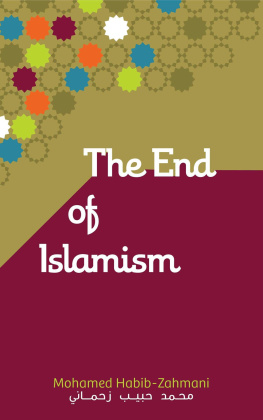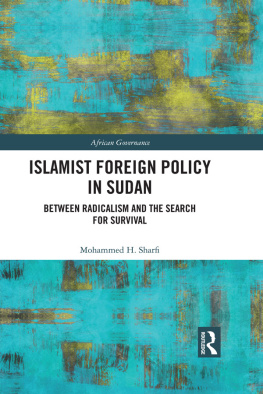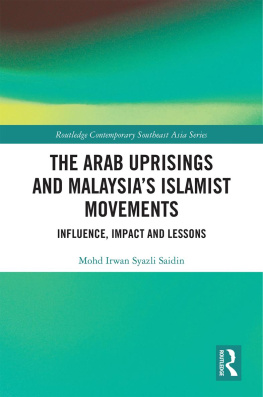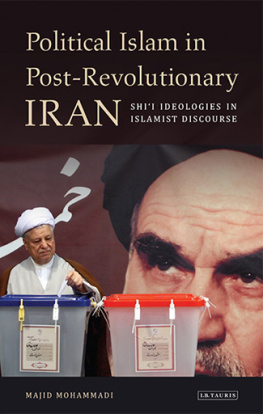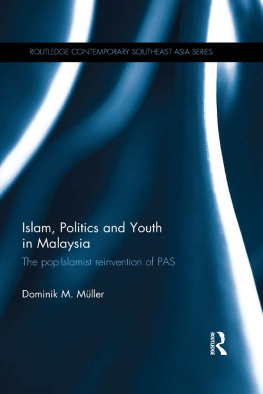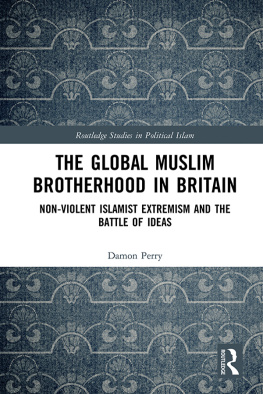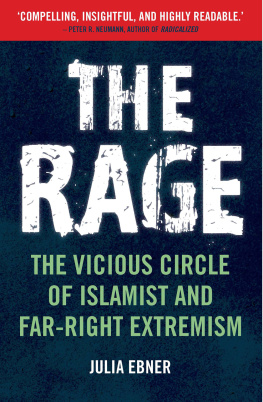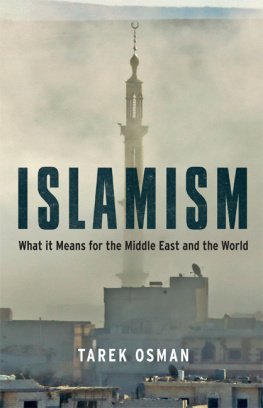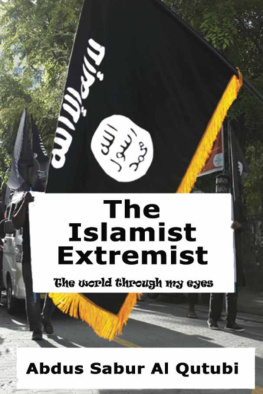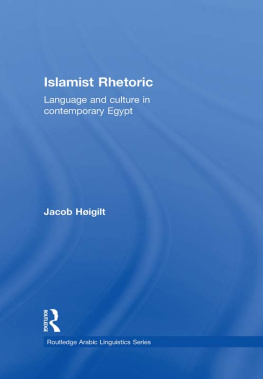The End
of
Islamism
Mohamed Habib-Zahmani
Copyright 2013 Mohamed Habib-Zahmani
AllRights Reserved
Tomy late father,
Myfirst living example of honesty and integrity
Chapter 1
Introducing The Prophets Way
1.1 In the Beginning...
Theirfaith was strong; it transcended material things and did not need worldlysupports. And because they had intimate rapport to God -and intimacy begetstrust- prophets and godly people often lived on the strict minimum, and povertywas their lot in this life although poverty is not a virtue per se and shouldnot be an aspiration. Many prophets were shepherds or craftsmen. They hardlygot more than what they needed for a basic life, yet they were happy andcontent (and happiness is nothing but total contentment), as their main concernwas not owning but being. And being reaches its depth and is fully realisedonly when one is almost free of the instinct of accumulation and worldlyconcerns and lives by God and for God. Sins and spiritual oblivion (which iscaused by, among other things, accumulation) reduce life experience and diluteones being.
Maryam (Mary peacebe upon her) whose friends included angels, the woman who reached the level ofGods Messengers without being one of them, and to whom the angels spokedirectly:
(Quran) Verily, God haschosen you, purified you and chosen you above the women of the worlds [mankindand jinn] (Maryam, Mary 3/42)
Thiswoman was not a princess nor was she wealthy. During the distress ofunexplained and miraculous pregnancy, God provided just water and dates for herand her unborn son peace be upon them.
Centuries beforeher, a divine act with similar meanings happened to another woman and her son.In the middle of lonely and tormenting hot desert, God gushed out water fromthe ground for Hagar and her son Ismail peace be uponthem. The believer does not take anything for granted; everything is by Hisgrace. Therefore divine gifts, whether big or small, always have a specialsweetness that comforts the heart of the believer.
The fountain Zam Zamwas the founding act of a village that would be called Mecca. The latter wouldremain out-of-sight and insignificant in world politics for thousands (if notmillions ) of years. But when its time comes thesmall settlement would suddenly change history of humanity and the geography ofthe world. And this was the reason of its creation, the reason of Zamzam, andthe reason why God ordered Ibrahim (peace be upon him) to leave his secondfamily there.
(Quran) God knows bestwhere [and with whom] to place His message ( al- Anaam,The Cattle 6/124)
Thisayah (Qurans term for Quranic sentence, in chapter four the reason fornot using the word verse is explained) is the first lesson we may draw fromthe choice of Mecca. To change the world, God chose a relatively isolateddesert town, surrounded by mountains, without infrastructures, an area withoutriver or quick access to the sea. More importantly, its small population wereremarkably unsophisticated. But this desert community of illiterates (asdescribed by the Quran) had amongst them the purest and most honest humanbeing, Mohamed peace be upon him.
The story of Mecca brings to the fore the divine hand. It teaches usthat Gods plans go beyond our social and political thinking, and our notion ofefficiency. Man would certainly have had a different starting point to launch aprocess of history making and global change. No one would have chosen asettlement of illiterate people in an arid valley in impenetrable land andsurrounded by much more advanced kingdoms and empires.
Furthermore, themillenniums long process that led to Mohamed (peace be upon him) reflects the cosmic dimension of the Quran and of the propheticphenomenon. The revelation of the Quran has at least two known temporal values.The first one is from the fateful journey of Hagar and her child Ismail (peace be upon them) to Arabia until the birth of Mohamed (peace beupon him). This period covered thousands of years (at least) and severalgenerations. The second one is the temporal value of Laylatal-Qadr(Night of decree, of power, or of measure), the night in which the Quran wassent down from the lawh al-mahfoodh (the Protected Tablet) in the higherheavens to the heaven of our world:
(Quran) Verily, we havesent it [this Quran] down in the Night of Qadar. And what will make you knowwhat the Night of Qadar is? The Night of Qadar is better than a thousandmonths. ( al-Qadar 97/1-3)
Leavingaside the trivialities, little stories, slurs and feminine gossips of someIsraelite anecdotes (which depict Ibrahim peace be upon him as a weak andheartless man who drove out his second family into remote wilderness to pleasehis terribly jealous and cruel wife Sara. The biblical tradition doesinjustice to everyone), God wanted Ibrahim to continue his mission where he waswhile initiating a parallel messianic process at the same time somewhere else.He therefore ordered him to take his second family to that place and leave themthere alone (unlike the bible, in the Quran Ibrahim accompanied his wife andchild in their difficult journey, which one would expect from any normal humanbeing). There, God would create a sacred town, site of pilgrimage, socialcontext for His last book as well as a suitable nation to bear His universalMessage. Hagar and Ismail were the first seeds of that divine enterprise; theywere not abandoned but sowed by Ibrahim in the Arabian desert .
History is not achain of accidents. Certainly, Islam and Mohamed (sws ) were not accidental events. But sometimesonly when a millennial process reaches its culmination we may see the hand ofGod making history. The seemingly directionless complexity, infinite amount offragmented wills of individuals and of nations ultimately serve and convergetowards the sublime will of God. Powerful nations may use their resources andinstrumental knowledge to structure the world according to their selfishdesires; the system of sanitized injustice and sophisticated falsehood may lookto be the inescapable destiny of humanity, but the Will of God will alwaysprevail.
The simple andlinear history of Mecca looks like a book that sums up the universal history ofmonotheism, the religion that God chose for humanity. The first chapter was thebuilding of Kaba (the cubic building), the first sacred point everbuilt on Earth, the first sanctuary for Gods creatures, the focal-point forall monotheists and the first place of collective worship of God:
(Quran) Indeed thefirst house appointed for mankind was that at Bakka [Mecca] a blessing andguidance for all worlds [i.e. all kinds of beings, men, jinn and others] (AalImran, The Family of Imran 3/96)
Thelast chapter was the coming of the final messenger of God from the same town.The unified design of history and the purposeful evolution of the world cannotbe clearer: it is in Mecca that the firstsacred space of monotheism was established; and it is from Meccathat the last divine call to monotheism went off! Between the twotranscendental events, there had been geological ages, a large number of true prophetsthroughout the world, and thousands of false religions.
Cosmic phenomenatranscend time; and can be vaguely sensed by the intelligence of the soul wellbefore they reach the visible domain. Humans as well as animals may capturethis unarticulated knowledge; and instinctively respond by unusual behaviour. Accordingly,years before the Quran was revealed to him, the Prophet Mohamed started to likeseclusion. He used to retreat every year and spend a whole month living in acave in the heights of the mountain of Hira. It was specifically the month ofRamadan, the same month in which he would receive the first words from theheavens. The seclusion, to the point of forgetting to eat and drink, wentbeyond his self or mastered consciousness. Malek Bennabi in his book TheQuranic Phenomenon judiciously compared these regular episodes of seclusion tounusual retreats of a certain type of ants in east Algeria just beforeearthquakes.
Next page
